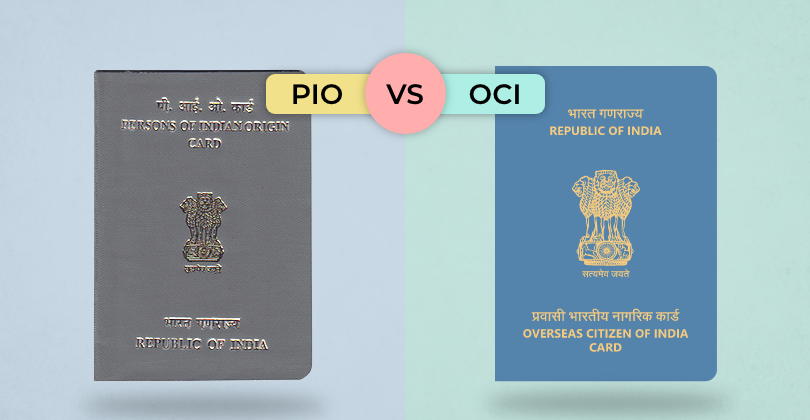Are you of Indian origin and living abroad? You've probably come across terms like PIO and OCI. These cards offer different benefits, but it can
Volunteering to cosign a loan for a relative or acquaintance means being their additional safety net. A cosigner makes a legally binding promise to make the payments on their behalf if the main borrower defaults.
Cosigning a loan carries potential risks. Let’s understand what cosigner means, things to consider before opting for cosigning, and everything you need to know.
What is the meaning of Cosigner?
A cosigner is someone who supports the principal borrower's loan application with their name, credit history, and financial information. They take legal liability for the loan sum and any related expenses if the borrower fails to make payments. Most people desire or need a cosigner because they cannot qualify for the loan on their own.
📗 Read more- Personal Loan Rejected? Here’s Probably Why
How Does Cosigning Work?
One of the most common cases of cosigning is when a parent signs an apartment contract for their children. First-time tenants sometimes lack sufficient credit history; therefore, a parent may cosign the lease. It reassures the landlord. In this case, the parent is not responsible for paying rent every month until the child is unable to do so.
A lender will ask for details on both the cosigner and the principal borrower when applying for credit with a cosigner. Both individuals will be required to supply personal information that permits the lender to conduct a credit check. The assessment decision and conditions for a cosigned loan will be determined based on both the cosigner's and borrower's backgrounds.
The primary borrower is responsible for loan payments each month. The cosigner becomes obligated in the event that the borrower is unable to make the repayments.
Pros and Cons of a Cosigner
| Pros | Cons |
|---|---|
| Loan approval odds may increasev | Missed payments may make the cosigner liable |
| Borrowers' chances of getting a bigger loan at a lower rate may improve. | Impact cosigner's credit score on default |
| Boost borrower’s credit score | The cosigner cannot manage the loan money or assets |
| Pros | Cons |
|---|---|
| Loan approval odds may increasev | Missed payments may make the cosigner liable |
| Borrowers' chances of getting a bigger loan at a lower rate may improve. | Impact cosigner's credit score on default |
| Boost borrower’s credit score | The cosigner cannot manage the loan money or assets |
What Needs to Be Taken Into Account Prior to Cosigning?
A request to cosign a loan warrants careful consideration. While a loved one might gain financially from the cosigner's healthy credit history, the impact on the cosigner's own finances should be thoroughly evaluated.
Before committing, several factors require examination.
-
The type of loan: Secured loans, backed by collateral like a car or house, can mitigate some risk. If the primary borrower defaults, the collateral is seized. However, the acceptability of collateral seizure for all involved parties should be assessed.
-
Cosigner’s state of finances: Cosigning a loan shouldn't be taken lightly. It's crucial to evaluate the relationship with the borrower and assess their trustworthiness. Can the borrower be relied upon to make repayments on time? Are there concerns about their ability to meet the loan's obligations? Open and honest communication regarding finances is essential with the borrower. Both parties should feel comfortable and confident with the cosigning agreement.
-
Cosigner’s connection to the principal borrower: Before cosigning a loan, an individual must carefully consider their relationship with the borrower. Can they be trusted to repay on time? Next, assess their financial health by looking at credit score, income, and existing debts. If everything is looking good, then only consider cosigning.
-
The consequences of cosigning in the long run: Cosigning a loan can be a worthwhile long-term strategy if it helps a child attend college or establish credit early. However, cosigning for a friend to pay off credit card debt or buy a car beyond their budget is generally not advisable. This decision could negatively impact both your finances and theirs.
📗 Read more- What is a Good Credit Score?
Does Cosigning Improve the Credit Score of the Cosigner?
Aside from supporting relatives or loved ones, cosigning can provide additional benefits, such as potentially increasing the cosigner's credit score. A cosigned loan can potentially increase the cosigner's credit score if the principal borrower makes on-time payments. Making on-time payments has a good impact on both the primary borrower and cosigner's credit reports, revealing careful debt management. As a result, it can help to improve the cosigner's financial standing over time.
Exploring Options for Loans With or Without a Cosigner
Personal, education, mortgage, etc., are among the most popular loan types that can include a cosigner. Essentially, loans that require this functionality are those that are larger and have more obligations for their borrowers to satisfy.
When it comes to home loans, having a cosigner can improve the chances of acceptance. However, borrowers may have additional choices available for obtaining a loan without a cosigner if they apply for a personal loan.
Obtaining an education loan without a cosigner may require a borrower to look for grants and scholarships provided by public and private institutions, colleges, etc. These financial assistance options may exclude some or all undergraduate loans without cosigner from reimbursements. Opting for a personal loan is another option a borrower may consider if a cosigner is not available. A borrower can utilise funds up to ₹500,000 and study further. But, since these options carry specific requirements, it is crucial to do thorough research before applying.
Conclusion
The importance of a cosigner in a loan agreement cannot be understated. Cosigners increase the primary borrower's chances of loan acceptance and may even help negotiate better terms, such as reduced interest rates, by providing their name and credit history.
However, there are risks to cosigning. If the main borrower defaults, cosigners are financially responsible for the entire loan amount plus all associated charges, which may harm their credit score and ability to maintain financial stability. Cosigning a loan requires understanding the impacts and evaluating one's personal financial situation, as well as the long-term effects.
AUTHOR
KreditBee As a market leader in the Fintech industry, we strive to bring you the best information to help you manage finances better. These blogs aim to make complicated monetary matters a whole lot simpler.







